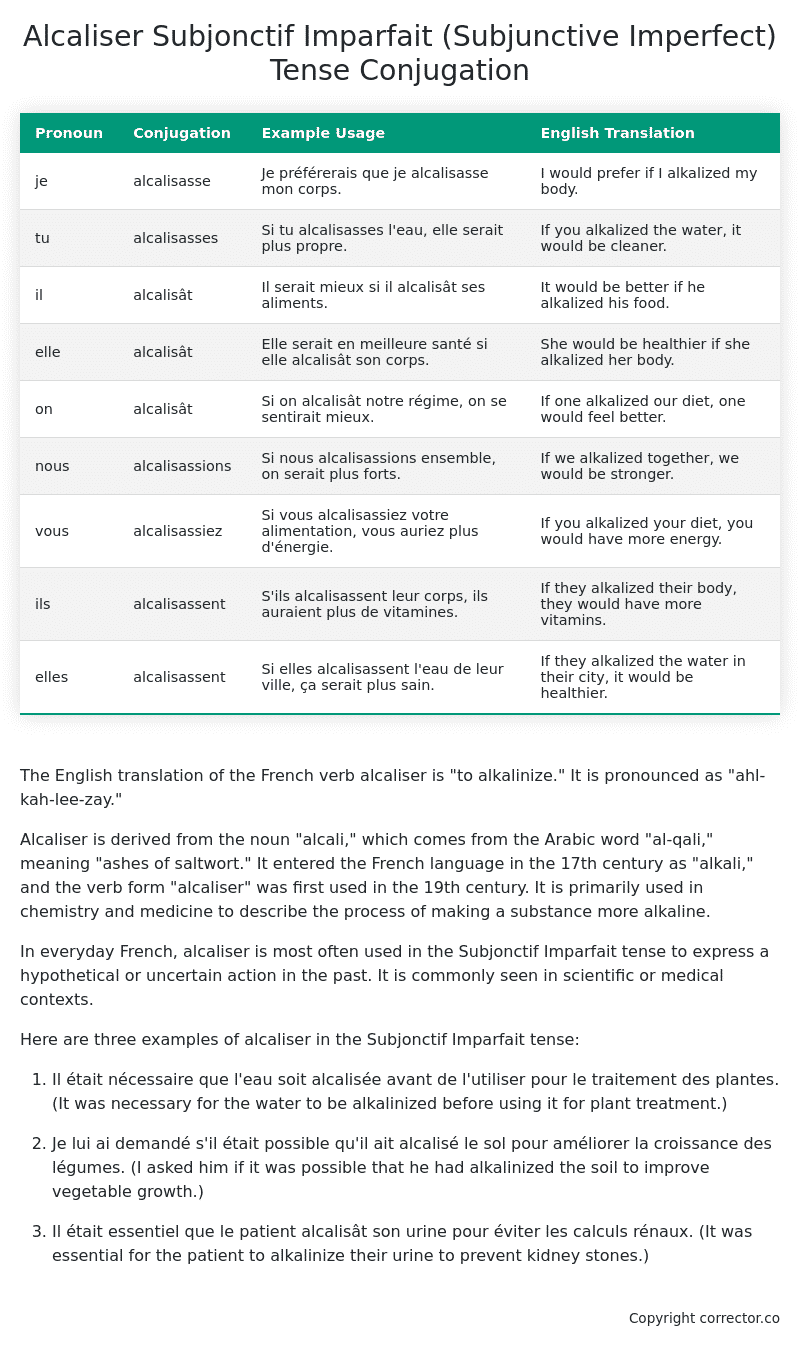Subjonctif Imparfait (Subjunctive Imperfect) Tense Conjugation of the French Verb alcaliser
Introduction to the verb alcaliser
The English translation of the French verb alcaliser is “to alkalinize.” It is pronounced as “ahl-kah-lee-zay.”
Alcaliser is derived from the noun “alcali,” which comes from the Arabic word “al-qali,” meaning “ashes of saltwort.” It entered the French language in the 17th century as “alkali,” and the verb form “alcaliser” was first used in the 19th century. It is primarily used in chemistry and medicine to describe the process of making a substance more alkaline.
In everyday French, alcaliser is most often used in the Subjonctif Imparfait tense to express a hypothetical or uncertain action in the past. It is commonly seen in scientific or medical contexts.
Here are three examples of alcaliser in the Subjonctif Imparfait tense:
-
Il était nécessaire que l’eau soit alcalisée avant de l’utiliser pour le traitement des plantes. (It was necessary for the water to be alkalinized before using it for plant treatment.)
-
Je lui ai demandé s’il était possible qu’il ait alcalisé le sol pour améliorer la croissance des légumes. (I asked him if it was possible that he had alkalinized the soil to improve vegetable growth.)
-
Il était essentiel que le patient alcalisât son urine pour éviter les calculs rénaux. (It was essential for the patient to alkalinize their urine to prevent kidney stones.)
Table of the Subjonctif Imparfait (Subjunctive Imperfect) Tense Conjugation of alcaliser
| Pronoun | Conjugation | Example Usage | English Translation |
|---|---|---|---|
| je | alcalisasse | Je préférerais que je alcalisasse mon corps. | I would prefer if I alkalized my body. |
| tu | alcalisasses | Si tu alcalisasses l’eau, elle serait plus propre. | If you alkalized the water, it would be cleaner. |
| il | alcalisât | Il serait mieux si il alcalisât ses aliments. | It would be better if he alkalized his food. |
| elle | alcalisât | Elle serait en meilleure santé si elle alcalisât son corps. | She would be healthier if she alkalized her body. |
| on | alcalisât | Si on alcalisât notre régime, on se sentirait mieux. | If one alkalized our diet, one would feel better. |
| nous | alcalisassions | Si nous alcalisassions ensemble, on serait plus forts. | If we alkalized together, we would be stronger. |
| vous | alcalisassiez | Si vous alcalisassiez votre alimentation, vous auriez plus d’énergie. | If you alkalized your diet, you would have more energy. |
| ils | alcalisassent | S’ils alcalisassent leur corps, ils auraient plus de vitamines. | If they alkalized their body, they would have more vitamins. |
| elles | alcalisassent | Si elles alcalisassent l’eau de leur ville, ça serait plus sain. | If they alkalized the water in their city, it would be healthier. |
Other Conjugations for Alcaliser.
Le Present (Present Tense) Conjugation of the French Verb alcaliser
Imparfait (Imperfect) Tense Conjugation of the French Verb alcaliser
Passé Simple (Simple Past) Tense Conjugation of the French Verb alcaliser
Passé Composé (Present Perfect) Tense Conjugation of the French Verb alcaliser
Futur Simple (Simple Future) Tense Conjugation of the French Verb alcaliser
Futur Proche (Near Future) Tense Conjugation of the French Verb alcaliser
Plus-que-parfait (Pluperfect) Tense Conjugation of the French Verb alcaliser
Passé Antérieur (Past Anterior) Tense Conjugation of the French Verb alcaliser
Futur Antérieur (Future Anterior) Tense Conjugation of the French Verb alcaliser
Subjonctif Présent (Subjunctive Present) Tense Conjugation of the French Verb alcaliser
Subjonctif Passé (Subjunctive Past) Tense Conjugation of the French Verb alcaliser
Subjonctif Imparfait (Subjunctive Imperfect) Tense Conjugation of the French Verb alcaliser (this article)
Subjonctif Plus-que-parfait (Subjunctive Pluperfect) Tense Conjugation of the French Verb alcaliser
Conditionnel Présent (Conditional Present) Tense Conjugation of the French Verb alcaliser
Conditionnel Passé (Conditional Past) Tense Conjugation of the French Verb alcaliser
L’impératif Présent (Imperative Present) Tense Conjugation of the French Verb alcaliser
L’infinitif Présent (Infinitive Present) Tense Conjugation of the French Verb alcaliser
Struggling with French verbs or the language in general? Why not use our free French Grammar Checker – no registration required!
Get a FREE Download Study Sheet of this Conjugation 🔥
Simply right click the image below, click “save image” and get your free reference for the alcaliser Subjonctif Imparfait tense conjugation!

Alcaliser – About the French Subjonctif Imparfait (Subjunctive Imperfect) Tense
Formation
Common Everyday Usage Patterns
Interactions with Other Tenses
Subjonctif Présent
Indicatif Passé Composé
Conditional
Conditional Perfect
Summary
I hope you enjoyed this article on the verb alcaliser. Still in a learning mood? Check out another TOTALLY random French verb conjugation!


